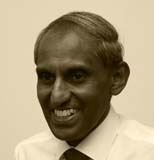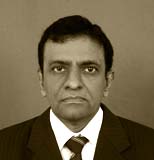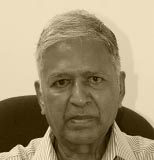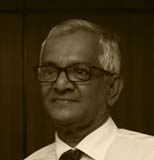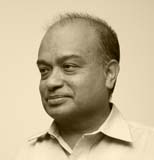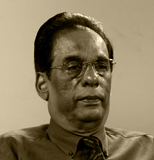- Abhaya Amaradasa, Mr.Read More...
Mr. Abhaya Amaradasa was educated at Royal College, Colombo, and is the General Manager of Associated Newspapers of Ceylon Ltd (ANCL). Mr. Amaradasa had the opportunity of learning printing in school which led him to apply for a position at ANCL. He joined ANCL in December 1980. Mr. Amaradasa has perused a career in Graphic Art and Printing Technology. Mr. Amaradasa has followed Tertiary Courses in Printing Technology covering Off-set Lithograph, Design for Print, Costing and Estimation and Graphic Repro photography, with first division Gold Awards. He has been awarded a higher Diploma in Printing Technology and Management with a merit distinction and Silver Award.
During Mr. Amaradasa’s tenure, ANCL introduced a classified advertising system with sorting in newspapers for Sinhala and English. This was the very first time that newspapers in Sri Lanka introduced a classified advertising system sorting. The ANCL newspapers Daily News and the Sunday Observer were published online by Lanka Internet for the first time on 4th September 1995. These were the first newspapers in South Asia to be published online. Since then ANCL has uninterruptedly published newspapers online. The Sinhala Unicode font Dinamina was also developed by ANCL and was given to ICTA and is offered free to users.
- Chandana Weerasinghe, Mr.
Read More...Mr. Chandana Weerasinghe is a Director / General Manager at DMS Electronics (Pvt) Ltd. He is a past pupil of Nalanda Vidyalaya. Chandana’s first exposure to computer systems was an undergraduate at the University of Moratuwa from which he graduated with a first-class honors degree in Electronics and Telecommunications Engineering. After graduation Chandana joined Data Management Systems (DMS) as an Engineer, in 1984. Thereafter, Mr. Chandana Weerasinghe was involved in supporting Wang minicomputer systems, the product which DMS handled at that time.
An important project which Mr. Chandana Weerasinghe handled was the introduction of Sinhala and Tamil into Wang computer systems. There was a demand at this time for computing in Sinhala and Tamil. Chandana and his team linked with the Wang global team which was working on inclusion of languages other than English in Wang computers. This development was mainly for word processing. The package was finalized and was to be launched but this was adversely impacted by a Court case on intellectual property rights, for which there was an out of Courts settlement after about a year. Subsequently DMS developed computing in Sinhala for PCs. DMS launched a Sinhala package called “MawBima” (මව් බිම) and a Tamil language package called “ThaiMozhi”.
Mr. Chandana Weerasinghe continued work as a visiting lecturer at the University of Moratuwa. He was also in the Committee which worked on setting up the IT Faculty at the University of Moratuwa. He was an external Faculty Board member of the IT Faculty. Mr. Weerasinghe continued to be involved in the work of the Department of Computer Science and Engineering at UoM too, as a visiting lecturer.
Mr. Chandana Weerasinghe is a Fellow Member of the Computer Society of Sri Lanka (CSSL), which he joined in the late 1990s. He has served as the President in 2003, as the Vice President, as Secretary and as Student Counselor of CSSL.
In 2003 the e-Sri Lanka Development Program was launched and the Information and Communication Technology Agency (ICTA) of Sri Lanka, was set up. Mr. Chandana Weerasinghe participated in the winding down process of CINTEC as an ex-officio member of the CINTEC Council. He also participated in meetings on setting up ICTA.
Mr. Chandana Weerasinghe was also a member of the Sectoral Committee on IT of the Sri Lanka Standards Institution (SLSI). This Committee worked on standards developed internally as well as international standards. Mr. Weerasinghe stresses the importance of standards for the industry. Finally, Mr. Weerasinghe states that Sri Lanka has come a long way in the ICT arena.
- Jagath Ranawaka, Mr.
Read More...Mr. Jagath Ranawaka was educated at Royal College, Colombo and received a Bachelor’s degree in Physical Science from the University of Colombo.
Mr. Jagath Ranawaka established his own company, Jagath Robotics Pvt. Ltd in May 1985. He has over thirty years’ experience in managing the company on areas which included sales and manufacturing computer hardware and software development, with more than 100 employees.
He has over thirty years of experience in professional software solution development involving developing, testing, implementing, documenting, requirement gathering, analyzing and designing and R & D. He has several years’ experience in designing electronics based factory automation systems including PLC Programming. He has overseas onsite experience in Russia (supplying computers for hospitals), in Kenya (installation of hotel management software/hardware, and in Singapore (software, hardware).
Mr. Ranawaka was the Founder President of the Sri Lanka Association for the Software Industry (SLASI) which he set up with several others in the software development field in Sri Lanka formed the. He is a Fellow of the Computer Society of Sri Lanka.
- John NLC Fernando, Mr.
Read More...Mr. John NLC Fernando was educated at St. Benedict’s College, Kotahena, Colombo and at the Faculty of Engineering at the University of Ceylon, Peradeniya, Sri Lanka. His interest in computers commenced when he was required to carry out an assignment using an Analog computer as a final year engineering student in 1967 at the University.
Mr. Fernando read for a Master’s degree in Computer Applications and Management at the Asian Institute of Technology in Thailand in 1979/80 on a Belgian Government Scholarship. His final year Master’s thesis was on the ‘Survey of resources for computer applications in Sri Lanka’. The field work was funded by the University Grants Commission, Sri Lanka and IBM World Trade Corporation. On graduation, Mr. Fernando joined IBM Sri Lanka in late 1980. He has been with for IBM 32 years up to 2012 in various capacities, in India, Hong Kong, Singapore and Sri Lanka, the last four years as a worldwide resource for internal training of IBM staff and literally living off airports.
Mr. Fernando states that his life parallels the history of computing in Sri Lanka from 1968 through initial installations of ICL computers with ICL Ceylon in Sri Lanka, with DMS-Wang mini Computers and later with IBM in Sri Lanka and overseas.
Mr. Fernando, initially from 1967 to 1973 was a Trainee Computer Engineer; then Computer Engineer, and Chief Computer Engineer at ICL Ceylon, and later from 1973 to 1976 was the Computer Engineering Manager at ICL Ceylon in Indonesia. At IBM World Trade Corporation Sri Lanka, he was Trainee Account Rep ; and Marketing Manager from 1980 to 1985, Customer Operations Manager from 1988-90; and Country Director {Country General Manager} from 1995 to 1998. Overseas Assignments which included responsibility for Sri Lanka included functioning as Business Planning Manager IBM South East Asia Region from 1986 to 1988, Brand Manager IBM ASEAN – AS/400 from 1993 to 1995, General Business – Brand Advocate IBM Asia Pacific South from 1998-2008, and IBM Worldwide – Sales Learning Facilitator from 2009 to 2012.
He has been a Senior Visiting Lecturer for the Master’s Degree in IT at the Sri Lanka Institute of IT (SLIIT) since 2004. He was also a Founder Director & ex Council Member of the Computer Society of Sri Lanka. Professionally he is a Chartered Engineer, Fellow of the Computer Society and a Fellow of the Singapore Institute of Arbitrators. He is a ACS certified SFIA IT Skills Assessor. He considers himself a world citizen having lived and worked in 8 countries.
- Lakshman Hettiarachchi, Mr.
Read More...Mr. Lakshman Hettiarachchi is a Chartered Management Accountant, member of the British Computer Society and an Attorney at Law who joined IBM as a Finance and Administrative Manager in 1979 and had been involved in Accounts and Budgets. He later moved into the marketing arena and eventually became the Country Manager of IBM Sri Lanka.
- Lal Chandranath, Mr.
Read More...Mr. Lal Chandranath is a former Managing Director of DMS Electronics Ltd and DMS Software Technologies. He was a member of the founder team of Data Management Systems Ltd (DMS) in 1978 and served as a Director until June 2017. He was also a founding team member of DMS Electronics Ltd in 1981, where he served as a Director until June 2017. Later in 2014, Mr. Chandranath was made Director/ General Manager of DMS Software Technologies (Pvt) Limited and he was instrumental in negotiating business agreements with Oracle Corporation covering many segments allowing for rapid growth. Mr. Chandranath has spent over 40 years in the ICT industry and is experienced in ICT areas such as Engineering, Customer Support, Software Development, Sales and Marketing, and Management and Leadership.
Mr. Chandranath was also a Council Member of the Council for Information Technology (CINTEC) – from 1992-1996 & from 1999-2000 – the former Government apex body on ICT and the predecessor to the ICT Agency (ICTA) of Sri Lanka. Mr. Chandranath was the Chairman of the National Informatics Olympiad Committee of CINTEC. He has also been a member and the President of the Computer Society of Sri Lanka. He has trained Sri Lankan student teams participating in Asian and international software competitions resulting in gold, silver and bronze medals for Sri Lanka.
Mr. Chandranath was educated at Kingswood College, Kandy and at the University of Peradeniya from where he was awarded a BSc (Hons) Degree in Electrical and Electronics Engineering. He has also followed a Postgraduate program in General Management at the Asian Institute of Management Philippines.
- Niranjan De Silva, Mr.
Read More...Mr. Niranjan De Silva is a former CEO of Metropolitan Computers. Mr. Niranjan De Silva’s first degree is in Electronics Engineering from the UK. He holds an MBA degree from the Postgraduate Institute of Management (PIM) of the University of Sri Jayewardenepura. Niranjan joined the Metropolitan Group as an Engineer in February 1981.
When Niranjan joined Metropolitan, Metropolitan was the monopoly supplier on banking equipment; ledger cards and printers. In 1982, the Bank of Ceylon (BOC) decided to automate. In early 1983, there was a BOC Tender calling for the supply of a computer with a ledger card printer.
Metropolitan offered for the Tender a Canon AS-100 computer with a Fujitsu ledger card printer. Mr. Niranjan De Silva and his team managed to win this Tender for Metropolitan although they were given only a week’s notice by BOC for a demonstration of the solution they were offering. This was an initial breakthrough and this was also an initial step in computerizing BOC and other banks.
Another challenging project on which Mr. Niranjan De Silva embarked was the project “Online Billing System” on electricity billing. Through this project, the process through which the electricity bill was made available to a consumer of the Lanka Electricity Company Private Ltd (LECO) was changed so that a consumer received the bill when the meter reader visited the consumer’s house instead of the bill being posted, which was done previously. Mr. Niranjan De Silva and his team won this Tender for Metropolitan.
Mr. Niranjan De Silva has also been the Secretary to the Computer Society of Sri Lanka (CSSL), he was the Treasurer, Vice President and he was also the President of CSSL. One of the most challenging tasks in which Niranjan was involved under CSSL was organizing the South East Asia Regional Computer Confederation (SEARCC) in 1995.
Mr. Niranjan De Silva states that he was happy to have been part of the Metropolitan Group, because it was a Company that focused on new technology and new solutions. Niranjan is working at present with a Japanese Company, Adam Innovations, and has set up the first international IT Park in Japan, where a few Sri Lankan Companies are already operating.
- Yasa Karunaratne, Mr.
Read More...Mr. Yasa Karunaratne was educated at Ananda College, Colombo. In 1967 he obtained his B.Sc. (Honors) degree from the University of Ceylon and served for two years in the Departments of Physics and Mathematics in the University. Thereafter, Mr. Karunaratne joined the State Engineering Corporation, which had the first public sector computer installation in the country, and it is here that he started his career in computing.
In 1970 Mr. Karunaratne joined the Department of Census and Statistics where he was fully responsible for architecting the 1971 Census of Population. In 1972, he joined the Ceylon Petroleum Corporation as the Systems Analyst and later became its Data Processing Manager. In 1979, Mr. Karunaratne was awarded a UN Fellowship for post graduate studies at the Colorado State University, USA, where he obtained his Master’s Degree in Computer Science in 1980. While he was there, he worked as an Information Specialist in a consultancy project for the US Department of Agriculture on the numerical integrity of their Road Design System. He returned to the Petroleum Corporation in 1981 and in 1983 he joined the Employees Trust Fund (ETF) Board where he was Deputy General Manager (Computer Services) until 2001. His appointment at the ETF Board allowed him to carry out consultancies for other organizations and Mr. Yasa Karunaratne was a Consultant to the first current accounting system at the Bank of Ceylon. He was a respected IT consultant to many Sri Lankan and International organizations and several Government agencies. He was a National Consultant to the United Nations in 1984. He has contributed to the development of Information Technology in diverse areas.
Mr. Yasa Karunaratne was one of the pioneers and a key figure in the Computer Society of Sri Lanka (CSSL) which was inaugurated in 1976. He has served in the Council of CSSL for three decades. From 1991 to 1999, Mr. Karunaratne was the President of CSSL. During his tenure as President, many milestones were reached. One such innovative venture was his idea to send Sri Lankan school children to software competitions overseas. Overcoming many impediments, he had put this idea into action in 1990. His determination yielded results when the Sri Lankan team won the International Software Competition in 1995, beating many countries in the region. Another milestone was securing a State of the Art building for CSSL, which had previously functioned in a room in the OPA (Organization of Professional Associations) building, which he almost single handedly planned and pioneered. In recognition of his contribution to CSSL, Mr. Karunaratne was awarded a distinguished Honorary Fellow of CSSL in 2001. Mr. Karunaratne has been the representative member for Computer Science at the OPA since 1989.
In 1992, Hon Ranil Wickremasinghe invited Mr. Karunaratne to assist in organizing the Infotel 1992 Conference and Exhibition. He was appointed as a member of the Main Organizing Committee and as Chairman of the Infotel Conference. This was a very successful Conference.
One of the key events during Mr. Karunaratne’s presidency in CSSL was hosting Sri Lanka’s first International IT Conference – SEARCC’95 of the South-East Asia Regional Computer Confederation. Mr. Karunaratne’s leadership as the Chairman of the SEARCC ’95 Organizing Committee enabled to boost Sri Lanka’s image internationally. Mr. Karunaratne has the distinction of being the first Sri Lankan to be the President of the South East Asia Regional Computer Confederation which comprised 13 countries in the Asia Pacific Region.
In 2002 Mr. Karunaratne was elected as the Secretary General of the South East Asia Regional Computer Confederation. In this position he was responsible for running the Secretariat and coordinating activities carried out in various countries. Mr. Karunaratne has also represented SEARCC in the World body, International Federation for Information Processing, IFIP. By participating in events in these countries it was possible to invite eminent ICT professionals to IT conferences in Sri Lanka and also invite them to conduct workshops which benefited professionals in Sri Lanka. In recognition of Mr. Yasa Karunartne’s contribution to the region, he was conferred “Distinguished Fellow of the South East Asia Computer Confederation”. He is the only person who has received this prestigious award.
He was also the recipient of the National Apex Award for Professional Excellence in Science and Technology in 2013 conducted by the Organization of Professional Associations.
Mr. Karunaratne was a member of Council for Information Technology (CINTEC) the previous Government apex body on ICT policy, from 1993 to 1999. He was also the inaugural Chairman of the Sri Lanka Information and Communication Technology Association (SLICTA), established with representation from the ICT industry, IT Professionals, Telecommunication Providers and Internet Service Providers.
Considering the future, Mr. Karunaratne states that technology and robots have replaced human labor in many industries, such as the car manufacturing industry and there is concern that the work carried out by professionals also may be replaced by technology. Therefore, the challenge for professionals is to explore ways and means of exploiting this new technology to make this world a better place.
- Data Bank of Industrial CorporationsRead More...
Plans were prepared in the nineteen seventies to establish a computer based system to monitor the progress of production and sales of Industrial Corporations which were under the Ministry of Industries. There were about twenty public Corporations, such as Steel Corporation, Hardware, Ceramics, Paper, Tyre, Oils and Fats and the Mineral Sands Corporation under this Ministry, and progress was reviewed monthly.
The computer system was installed at the National Institute of Business Management (NIBM) and stored production and sales data of each month of the Industrial Corporations. It was funded by UNDP and ILO. Dr. Bill Smythe of Canada was the Consultant for the project. A Wang minicomputer system was purchased through Data Management Systems Ltd. (DMS) in 1978 for the purpose. It had 256 KB memory, the largest memory in the country at that time, and 10 MB of hard disk of which 5 MB was fixed and 5 MB was on 2-foot diameter removable platters, and an 8” diameter diskette drive, five interactive terminals, and a floor standing matrix printer. There were no punch cards as in other computer installations in the country at that time.
top - Chandana Weerasinghe, Mr.


